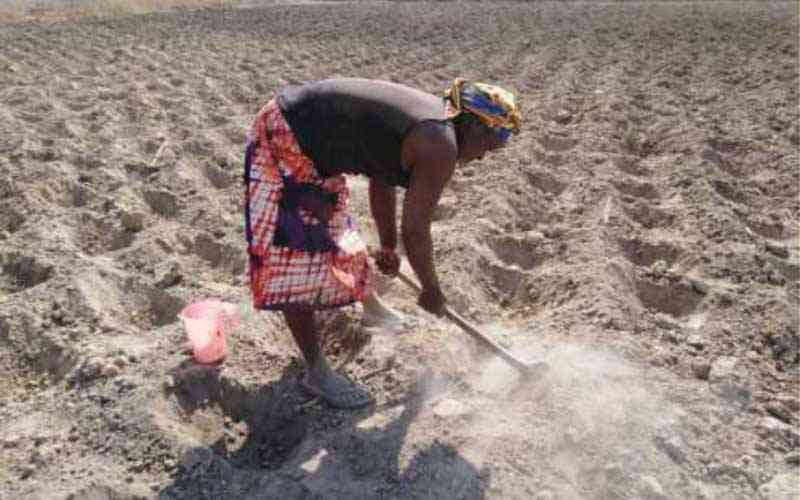
Meddy Munkombwe had pitiable harvests over the years that at some point she almost gave up farming.
Successive crop failures and poor harvests driven by climate change in Binga have taken a toll on agriculture production leaving many families in abject poverty.
As such, Munkombwe of Siamuloba village under Chief Sialichaba is among thousands in Binga that face serious food shortages, which if not urgently addressed, could lead to starvation.
Binga — one of the marginalised communities in Zimbabwe — is already facing a food crisis, villagers said.
“This past season, our crops did not do well because of the little rainfall that we received,” Munkombwe said.
“Over the years we have had poor harvests and sometimes you would think of completely leaving farming.
“Our area is very dry and receives erratic rainfall.”
A flagship publication of the United Nations Department of Economic and Social Affairs titled World Social Report 2021 says a large population of more than three billion people in rural areas of developing countries depends on agriculture for livelihoods.
- COP26 a washout? Don’t lose hope – here’s why
- Out & about: Bright sheds light on Vic Falls Carnival
- COP26 a washout? Don’t lose hope – here’s why
- Out & about: Bright sheds light on Vic Falls Carnival
Keep Reading
The report says these people live on less than US$2 a day and in cases of extreme droughts and floods driven by climate change like in the case of Munkombwe this poses an increasing threat to their lives.
“We usually have porridge in the morning, skip lunch and have sadza for supper,” she said.
“However, we can go for a day or so without the staple food because of our poor harvests.”
According to the World Food Programme, an estimated 30% of the country’s population is set to be affected by El-Nino-induced drought, with dry-prone communities such as Binga being the most hit.
Despite living on the fringes of the Zambezi River, Munkombwe has had to do with a small dry plot.
“I have a small garden near the river (Zambezi), but we grow vegetables,” she said.
“My plot is dry and not fertile at all, hence these lower yields.
“We have tried these small grains, but they are failing.”
Successive crop failures and poor harvests in Binga have taken a toll on agriculture production prompting the Zimbabwe Red Cross Society (ZRCS) to cater for the humanitarian needs for thousands of people through food and health interventions.
The project, which is being supported by the Finish Red Cross and Danish Red Cross, is running under the Climate Smart Resilience project until 2025.
“The project’s goal is to contribute to enhanced individual, family, community and institutional resilience through strengthened capacities to cope, resist and endure risks,” said ZRCS secretary-general Elias Hwenga.
“Binga communities are vulnerable to the devastating impacts of climate change, so there is need to assist these communities to adapt as a strategy of building resilience to the impact of climate change.”
Hwenga said the innovative activities are being done through comprehensive climate change adaptation initiatives centred on the sustainable livelihoods framework, which utilises the vulnerability context, community assets and livelihood strategies for sustainable livelihood outcomes.
One such initiative is the seed distribution programme that has seen 4 000 households receiving drought-tolerant seed such as pearl millet and cow peas.
“I received 5kg seed of millet and 2,5kg of cow peas from Red Cross,” said Christabel Nyoni (43), Sibwande village in Siansundu.
“This seed will go a long way in addressing food insecurity since they are short-season varieties.
“We are happy that Red Cross has given us the seed on time.”
Nyoni said she was looking forward to increasing her yield this coming season.
“For five years I have been growing crops but at a small scale because of lack of knowledge,” she said.
“Now that I have the knowledge and the seed, thanks to Red Cross, I am hoping to increase the yield.
“This method of farming we got from Red Cross and government has the potential to boost our harvest next year.”
However, Nyoni said they still needed fertiliser to maximise the yield.
She is expecting to double her harvest from last season when she harvested 44 buckets of millet.
According to the World Food Programme, at least 49% of Zimbabwe’s population lives in extreme poverty and it is estimated that 5,3 million people across rural and urban areas are food insecure – many impacted by the effects of climate change and protracted economic instability.
Binga, being one of the driest districts in the country, is among the worst affected.
“Our major crop is millet, but we sometimes fail to have good harvests because of poor rains,” said Rodias Mumpande of Simwenga village in Siansundu West.
“We, however, have to supplement our food by doing small jobs.
“A bucket of maize costs US$8 while that of millet costs US$7 and we are a family of seven.”
Mumpande said there was need for communities to be empowered with climate change resilience programmes.
Apart from the seed distribution programme, ZRCS is training farmers on seed production and the organisation has rehabilitated 12 boreholes.
“Farmers are being trained on seed production to allow communities to set their own seed banks for drought-tolerant crops and not to rely on seed aid,” said Hwenga.
“We have repaired boreholes and this will improve access to safe water for communities and plans are that we will upgrade some boreholes into piped water schemes to reach out to more people.”
Under the Climate Smart Resilience programme, ZRCS is also facilitating community led projects that deal with hazards that they face in their respective areas.
Disability and inclusion training have been done under the programme targeting Red Cross volunteers, community leaders and people with disabilities.
First aid, sexual and reproductive health rights as well as sexual gender-based violence training have been rendered to fishermen and volunteers.










